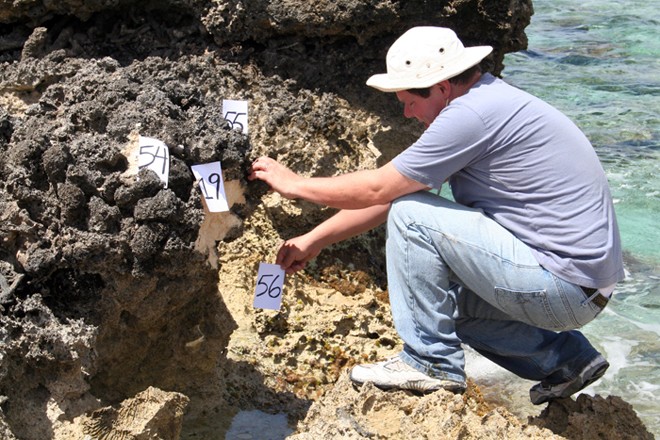Possible future sea-level changes hinted by new coral dating methods
by Woods Hole Oceanographic Institution on 21 Sep 2011

WHOI geochronologist William G. Thompson, lead author of the study, sampling a fossil coral on Great Inagua Island, Bahamas in 2006. H. A. Curran, Smith College
New evidence of sea-level oscillations during a warm period that started about 125,000 years ago raises the possibility of a similar scenario if the planet continues its more recent warming trend, says a research team led by the Woods Hole Oceanographic Institution (WHOI).
In a paper published online in the Sept. 11 Nature Geoscience, the researchers report data from an improved method of dating fossil coral reef skeletons in the Bahamas. By calculating more accurate ages for the coral samples than previously possible, they found that sea levels were considerably less stable than earlier believed--oscillating up and down by four to six meters (13-20 feet) over a few thousand years about 120,000 years ago during a period known as the Last Interglacial.
'This was the last time that climate was as warm as—or warmer than—today,' said WHOI geochronologist William G. Thompson, lead author of the study. 'If today’s ice sheets continue to melt, we may be headed for a period of ice sheet and sea-level change that is more dynamic than current observations of ice sheets suggest.'
The polar ice caps currently are shrinking and sea level is rising at a rate of about 30 centimeters (one foot) per century. 'How much sea level will rise over the next century or two is a crucial question for the significant part of the world’s population that lives in coastal zones,' Thompson said.
A better understanding of sea-level change in the past can help to inform predictions for the future. Historical records such as those from tide gauges extend back only a century or so. 'The geological record offers a longer perspective on rates of change,' Thompson said, 'and sea-level changes during previous warm intervals are especially relevant to today’s situation.' Sea levels during the Last Interglacial are known to have been about six meters (20 feet) higher, on average, than they are today. 'The real surprise is that sea levels were oscillating during this period.'
To get more accurate age estimates from the geological record, Thompson developed an advanced way of interpreting the uranium and thorium isotope ratios that have been traditionally used as a coral dating method. Until now, scientists attempting to date Last Interglacial coral reefs concluded erroneously that sea level was relatively stable during this period. 'Our analysis of Last Interglacial fossil reef ages represents a breakthrough in our understanding of U-Th coral dating, leading to improved chronologies of past sea-level change,' Thompson said.
Thompson teamed up with colleagues H. Allen Curran and Brian White of Smith College, and Mark A. Wilson of the College of Wooster, experts on the key Bahamas fossil coral sites. 'The geologic evidence for sea-level change at these sites is convincing,' said Curran, 'but we couldn’t absolutely prove sea-level oscillation without more precise dating.'
Because coral reefs grow near the sea surface, they are accurate markers of former sea levels. Two fossil reefs are evident at the Bahamas sites, separated by an erosional surface that was cut by wave action. The first reef grew when sea levels were about four meters (13 feet) higher than today. 'The fall of sea-level is indicated by the wave-cut erosion of this first reef,' said Wilson, 'and the second sea-level rise was recorded by the growth of new corals on this eroded surface. The dating of fossil corals below and above this erosional surface, using our new methods, reveals important details about the timing of sea-level change that were previously obscured.'
The finding of a significant sea-level oscillation 120,000 years ago is in sharp contrast to the last 5,000 years, where sea level has been relatively stable. 'It appears that the smaller ice sheets of the Last Interglacial were significantly less stable than today’s ice sheets,' Thompson said.
Should the current warming trend continue, Thompson said, a scenario similar to that of the Last Interglacial could result. 'Variable sea level during the last Interglacial points to instability in the polar ice sheets, which were somewhat smaller than today. If changing climate leads to smaller ice sheets in the future, this may provoke similar instability.' The work was supported by the WHOI Ocean and Climate Change Institute, the Comer Science and Education Foundation, and the National Science Foundation.
Woods Hole Oceanographic Institution website
The Woods Hole Oceanographic Institution is a private, independent organization in Falmouth, Mass., dedicated to marine research, engineering, and higher education. Established in 1930 on a recommendation from the National Academy of Sciences, its primary mission is to understand the ocean and its interaction with the Earth as a whole, and to communicate a basic understanding of the ocean's role in the changing global environment.
If you want to link to this article then please use this URL: www.sail-world.com/88732